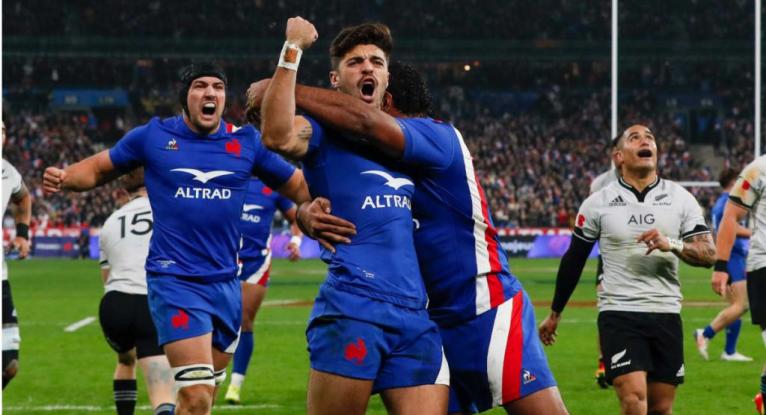“We’ll never have it as good again,” said a cherished former colleague, the Daily Mail’s Peter Jackson, as we headed out for dinner from our hotel near the Boulevard Saint-Germain in Paris on the eve of the last Rugby World Cup to be held in France.
He didn’t get many things wrong, did Jacko – and, no, we won’t be mentioning his back page splash on the morning of the 1999 World Cup final, ‘Barring a last-minute hitch, Jonah Lomu will today become the game’s first millionaire as he turns his back on New Zealand to join Bristol’. As we now look forward to the next edition to be held in the Ovalie, it’s easy to reflect that perhaps he did have a point 16 years ago. Who can say with hand on heart the sport is in a better place than it was back then?
Premiership clubs going bust, Welsh rugby assailed on all fronts, desperate for an uplift on and off the field, participation numbers dropping, leaving the sport reeling as if it itself had been knocked senseless like so many of its troubled former warriors have been. Concussion is a blight and despite the long-overdue focus on trying to address the issue, remains even more of a concern than any financial pressures.
There is little doubt there are grave issues in the sport notwithstanding the fact the 2023 World Cup will surely be a great success, full of snarl as well as sublime skills.
Okay. That’s the glass-half-empty picture. There are sunny uplands out there. Munster in Cape Town, the scenes in La Rochelle, Ireland and France going toe-to-toe, Antoine Dupont, the burgeoning women’s game (albeit the competitiveness of the Six Nations tournament needs bolstering), the list is plentiful. It’s not a black-and-white equation we’re trying to work out here, to prove conclusively one way or the other that such-and-such a perspective is the right one. It’s far more nuanced than that.
But there is little doubt there are grave issues in the sport notwithstanding the fact the 2023 World Cup will surely be a great success, full of snarl as well as sublime skills, launching with that thunderous clash between France and the All Blacks on the opening night. That there are too many lulls during the pool stage thereafter will be offset by a knockout phase that promises to be never less than gripping and momentous.
But back to Jacko and his wistful observation. Given that this is a man who covered some 500 Test matches since he first crossed the Irish Sea from his native Derry and an early stint on the Belfast Telegraph to work for the South Wales Echo and on to the Daily Mail in 1974, his perspective merits attention. He may have been referring to our own trade and the fast-changing nature of the newspaper business but it holds true for rugby as well. It was only recently as we toasted Jacko’s 80th birthday in Cardiff that we also had cause to raise a glass to the passing of a former International Rugby Board powerbroker, Bernard Lapasset, one of those caches of administrators who oversaw the move from amateurism to professionalism in 1995.

Has it worked? Well, there was no alternative. The game would have gone pro with or without the blessing of the IRB (the forerunner of World Rugby). There was too much strain on its amateur regulations as it was. That dam had pretty much been breached. The Kerry Packer-type rebel circus was a genuine entity which would have featured all the game’s leading players.
If you had a blank sheet of paper, what would you draw up now for the future of the sport? The Rugby World Cup is a must-have. It was literally on the eve of the final in the 1995 tournament in South Africa that the effective deed was done. The announcement that day was of the mega-dollars deal to hold an annual Tri Nations event in the southern hemisphere, underscored by Super Rugby. The death knell for amateurism had sounded even though it was another couple of months before the transition was ratified in Paris.
That 1995 event was only the third staged. The sport would scarcely exist as an acceptable global professional entity without it. Witness the struggles of rugby league (whose next World Cup has just been canned) and even Test cricket that struggles for worldwide validity to understand just how significant a proper global event is. Athletics, for example, endures almost wholly on the strength of its Olympic and championships profiles. That’s how big a deal RWC 2023 is. It lends the sport credibility as well as gives it exposure beyond its normal confines.
Club rugby may be struggling in England but the set-up is still a far better thing than the once-proposed regional rugby.
The World Cup, then, is a must-have. And to think the dyed-in-the-wool administrators at various unions had grave reservations about endorsing it at all back in the early-to-mid eighties. Could the format be improved? We could certainly do without the draw being made three years before the event. That has to change to avoid the ridiculous lop-sidedness of this year’s tournament with all the principal seeds stacked in one end of the draw. What else?
There was a scheme mooted once whereby the losing pool teams should then have a concurrent tournament to run parallel to the knockout stage. That would be a great boon to those sides and also help fill the necessary week-long gaps between rounds.
What else in the sport could have or should have been different?

Club rugby may be struggling in England but the set-up is still a far better thing than the once-proposed regional rugby. See how the clubs prosper and draw on their community roots in France. That is the template to follow. If the great Welsh clubs had been supported there would be less angst now. An Anglo-Welsh league should have been cemented in place. It’s perhaps not even too late now.
Rucking should never have been outlawed as it was in the nineties, on safety grounds for goodness’ sake. The resulting big-hit obsession has stemmed from that. Crooked feeds, chit-chat back and forth with referees, overuse of the TMO – I’d actually revert to referee’s decision is final without technology but we might be beyond that – all these are elements that were better implemented in days of old.
At least Lions tours have been set in stone in the calendar. And for that we must be truly grateful. Jacko would certainly approve.



Comments
Join free and tell us what you really think!
Sign up for free